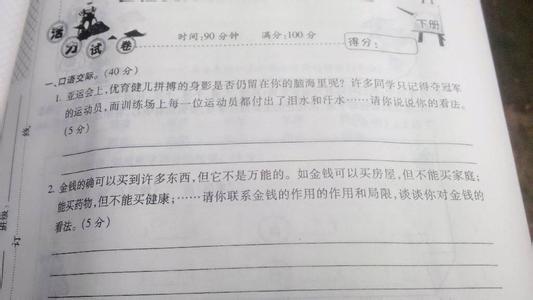GCT 口语交际部分讲义 景;3英美文化习俗
1. 2. 3. 4. 5. Eg. Teacher: Are you following me?
Student: .
A: Can you walk slowly, please?
B: I’m afraid.
C: Let think of it.
D: Who knows?
1.
2.
3. 1、介绍
看见Introduce 就是介绍某人
初次见面我们通常说nice to meet you ,或者向对方打招呼。
答:How do you do? 你好!(正式场合)
I'm pleased to know you.很高兴认识你。
Very glad to meet you.很高兴认识你。(非正式场合)
Nice to meet you.很高兴认识你。(非正式场合)
It's a pleasure to meet you.认识你很高兴。
2、问候
(1)一般打招呼用语,答语通常是重复对方的话。
Hello.你好!Hi嗨!Good morning (afternoon, evening)早上(下午、晚上)好。
(2)您好!初次见面打招呼的用语How do you do? / Glad to meet you.
答语也是"How do you do? / Glad to meet you."
(3)对有一段时候没有见面的熟人可选用这些句型:
How are you?/ How have you been?你(您)好吗?
答语往往是:”Fine, thank you. And you ?”
Fine 固然是个常用词,表明答话人的状况良好, 但是生活中的情形不完全是这样的, 比这更好的情形和更差的情形都应该知道。
Terrific/awesome/fantastic/ fabulous/superb/excellent /couldn?t be better 这都是过得特别好 Just so so 马马虎虎
nothing particular 没什么特别的
just one of those days 老样子
not too bad / can?t complain (表生活或工作)就这么过呗,还能抱怨吗
(4)向认识但不常见面的人打招呼,可选用这些表达法。
How?s everything with you?/ How is everything going? /
How are you getting on? /What?s up? 近来怎么样?
How have you been lately ? 最近怎么样?

答语可用:“Pretty well."/ " Very well."/ "Everything is OK.(一切顺利)"/Not too bad.“还好”。
转达对母亲的问候 Give Mom our love.
总结:
How are you?--- Fine, thanks. And you?
How do you do?---How do you do?
Nice to see you.--- Nice to see you, too.
How are you doing?---I?m doing great. What about you?
Hi, Jane.How is life?--- On top of the world, thanks.
How are things with you? ---Not too bad, thanks.
How is everything going? ---Not too bad, thanks.
How have you been? ---Not too bad, thanks.
3、告别
Goodbye! See you! So long. Hope to see you again soon. Must be going.
Nice meeting you. It’s been good talking to you. Take care!
答:See you/委婉的挽留别人
—Hello, I'm David Chen. Nice to meet you.
—_______
A.Are you?
B.Nice to meet you too.
C.Yes.
D.Very nice.
—How?s your family?
—_________
A.Thanks all the same.
B.Thanks for calling.
C.Not too bad.
D.Don?t mention it.
真题: 07-1 09-1
例 A: Marry, you look very well.
B: Thank you, Jane. You look wonderful. Your weekend swimming must have done good to you. 受到赞美时 要么礼貌的表示谢意 要么表认可 一般不给于否定表谦虚
A: You think so? That?s encouraging.
B: That?s very kind of you. 对别人特意帮助的回答
C: Are you serious? Thank you, anyway.
D: Are you kidding? I don?t believe it.
?常用表达
You look gorgeous in this dress!
Thank you, you are so sweet. You look great, too.
评论 ?对某事物发表看法时,往往会得到对方的附和回应
双方都喜欢 或支持某事时
So do I. 或 So am I.
Yes, it?s great. Isn?t it?
Yes, me too.
双方都不喜欢 或都不支持某事时
Neither am/ can/ do I. Yes, it?s awful, isn?t it?
真题 04-50 05 -50
Do me a favor and do...,will you?
Can/will you do...?
Could/ would you do...,please?
I wonder if you could possibly do...?
Would you mind doing...?
May I ...?
2.愿意
Yes, of course. Sure / Sure thing. No problem. Alright.
With pleasure.
3. 不愿意
I?m afraid I can?t.
I really/ do wish I could help you, but I?m afraid....
I? d like to help, but I?m afraid...
I?d love to help, only...
陷阱:
Would you mind opening the window?
Would you mind if...
Mind if ... ?
注意上面三种问法 如果不介意的话 回答 certainly not. / of course not./ Yes, …
介意或者不同意 回答 I?m sorry, but…// No,…
特别注意不要选包含前后矛盾说法的迷惑选项
Eg. Would you mind going to the movies this evening?
Of course not. I?d like to.
I?m sorry. But I haven?t finished my homework yet.
03-47 06-44 05-45 09-44
1.提建议
How about / what about...?
Let?s...
Shall we...?
Why don?t we...?
Why not...?
I thought you might like to...
It might be a good idea to...
We might as well...
Would it be better to...
I should like to put forward a suggestion.
I wonder whether you?d like to ...
I?d like to suggest...
爱华网www.aIhUaU.com网友整理上传,为您提供最全的知识大全,期待您的分享,转载请注明出处。
 爱华网
爱华网



